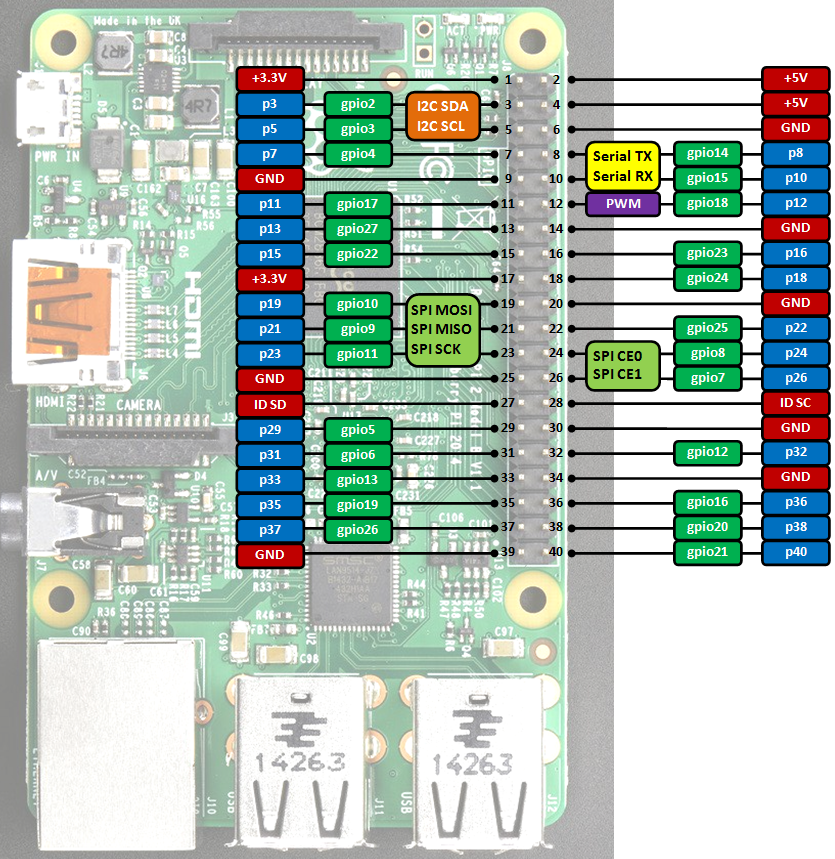mbed API for Raspberry Pi boards.
mbedPi
This is an attempt to implement a limited number of mbed APIs for Raspberry Pi single-board computers. The project was inspired by and based on the arduPi library developed for the Arduino by Cooking Hacks .
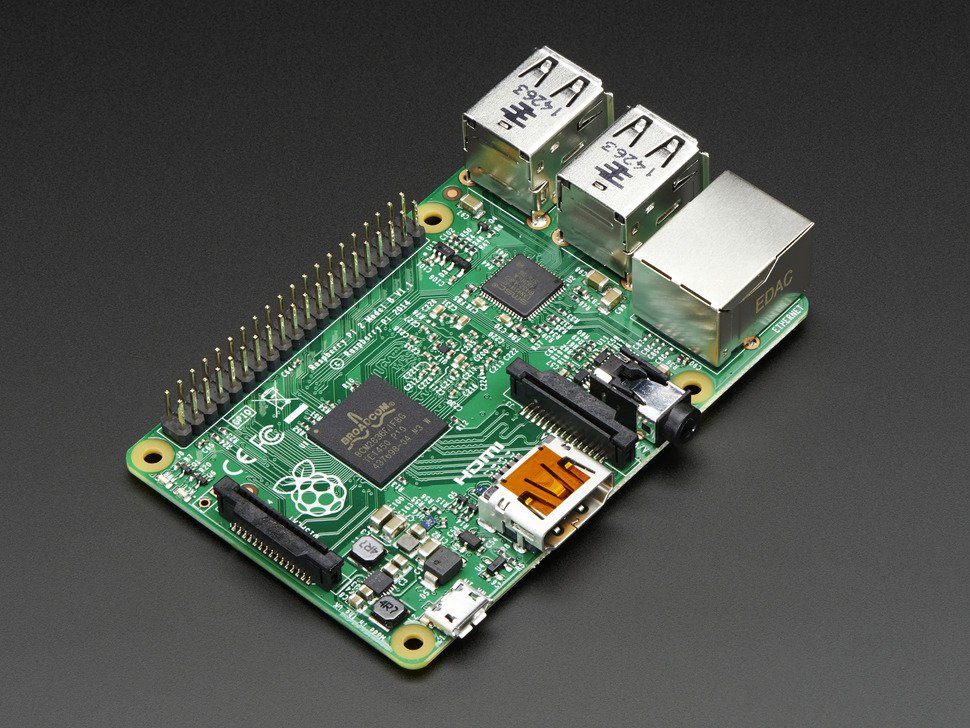
Specifications
- Chip: Broadcom BCM2836 SoC
- Core architecture: Quad-core ARM Cortex-A7
- CPU frequency: 900 MHz
- GPU: Dual Core VideoCore IV® Multimedia Co-Processor
- Memory: 1GB LPDDR2
- Operating System: Boots from Micro SD card, running a version of the Linux operating system
- Power: Micro USB socket 5V, 2A
Connectors
- Ethernet: 10/100 BaseT Ethernet socket
- Video Output: HDMI (rev 1.3 & 1.4)
- Audio Output: 3.5mm jack, HDMI
- USB: 4 x USB 2.0 Connector
- GPIO Connector: 40-pin 2.54 mm (100 mil) expansion header: 2x20 strip providing 27 GPIO pins as well as +3.3 V, +5 V and GND supply lines
- Camera Connector: 15-pin MIPI Camera Serial Interface (CSI-2)
- JTAG: Not populated
- Display Connector: Display Serial Interface (DSI) 15 way flat flex cable connector with two data lanes and a clock lane
- Memory Card Slot: Micro SDIO
GPIO connector pinout
Information
Only the labels printed in blue/white or green/white (i.e. p3, gpio2 ...) must be used in your code. The other labels are given as information (alternate-functions, power pins, ...).
Building programs for the Raspberry Pi with mbedPi
I use Qt Creator for development, however you can use any other IDE available on the Raspberry Pi (e.g. Geany) if you like. For a quick try:
- Install Qt and the Qt Creator onto your Raspberry Pi. Then create a new "Blinky" Plain non-Qt C++ Project as follows:
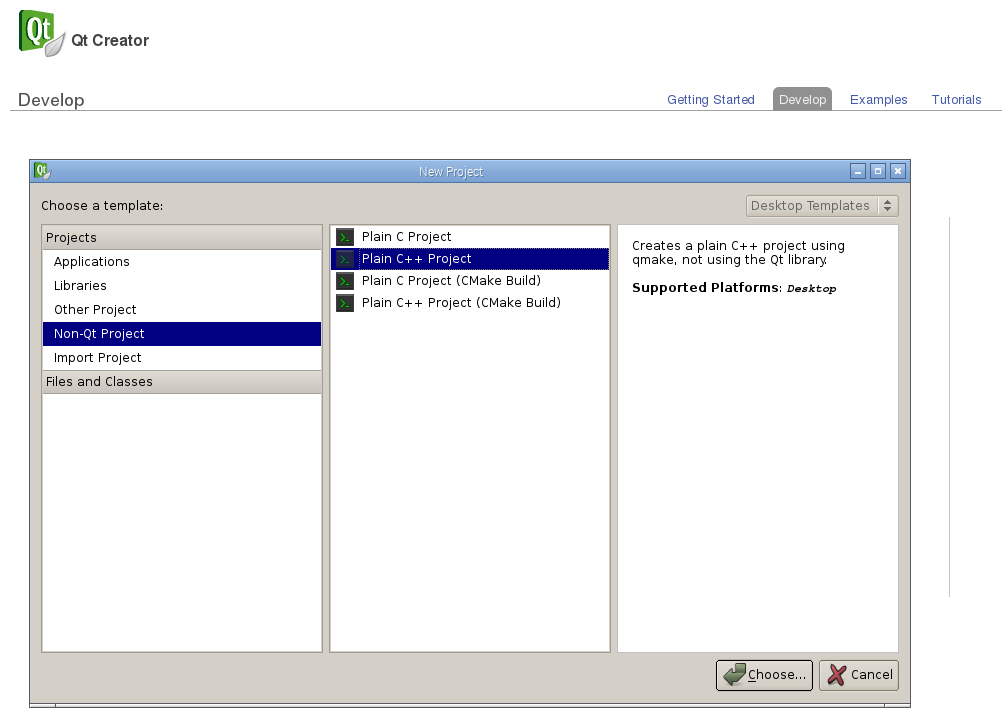
- Change the main code as below:
main.cpp
#include "mbedPi.h"
int main()
{
DigitalOut myled(p7);
while(1) {
myled = 1; // LED is ON
wait(0.2); // 200 ms
myled = 0; // LED is OFF
wait(1.0); // 1 sec
printf("Blink\r\n");
}
}
- Copy the mbedPi.zip file into your project's folder and unzip.
- Add the mbedPi.h and mbedPi.cpp files to your project by right clicking on the "Blinky" project and then clicking on the "Add Existing Files..." option in the local menu:
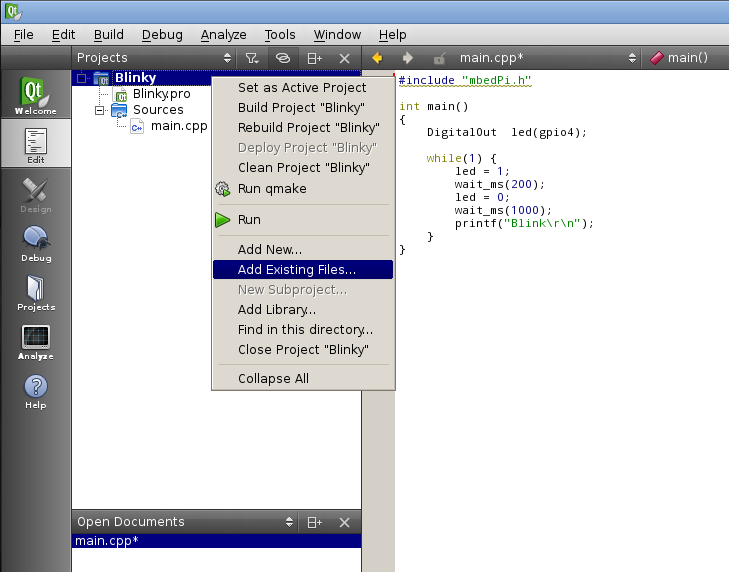
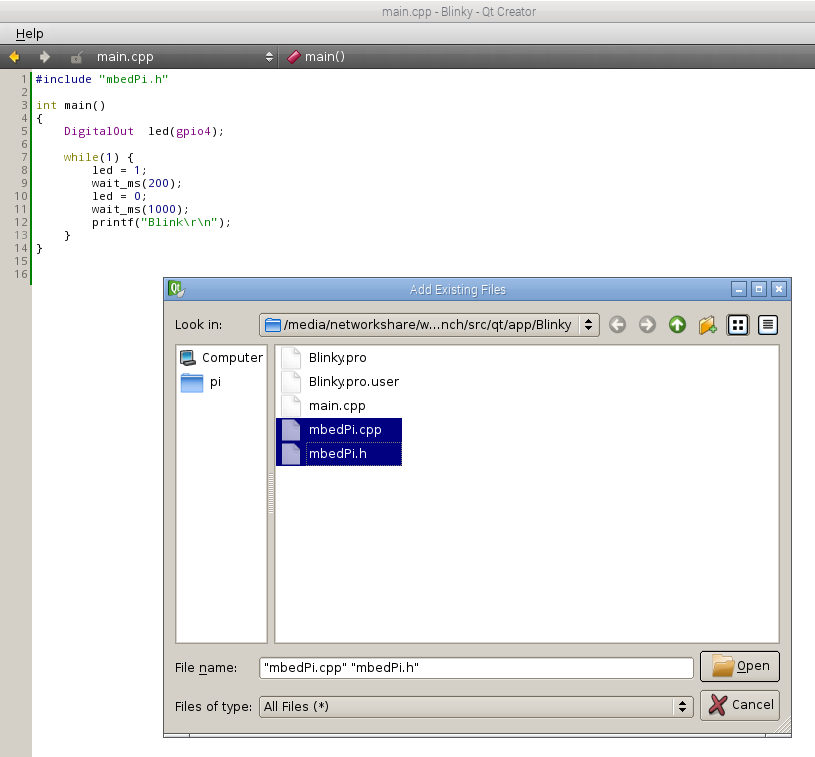
- Double click on Blinky.pro to open it for editing and add new libraries by inserting a new line as follows:
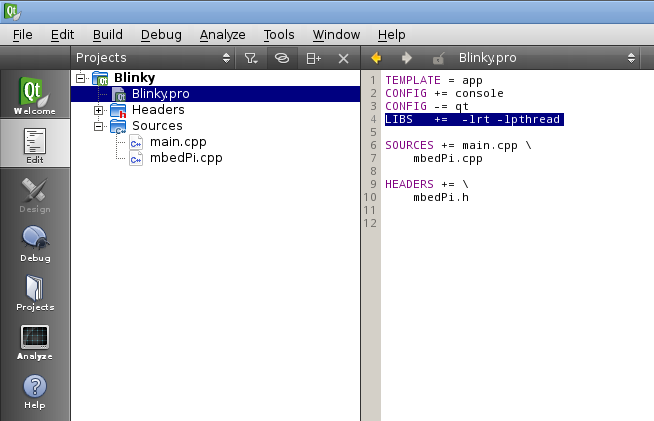
- Compile the project.
- Connect an LED through a 1k resistor to pin 7 and the ground on the Raspberry Pi GPIO connector.
- Run the binary as sudo (sudo ./Blinky) and you should see the LED blinking.

- Press Ctrl+c to stop running the application.
Diff: source/SPI.cpp
- Revision:
- 1:1f2d9982fa8c
--- /dev/null Thu Jan 01 00:00:00 1970 +0000
+++ b/source/SPI.cpp Tue Dec 20 12:08:07 2022 +0000
@@ -0,0 +1,259 @@
+#include "mbed.h"
+
+extern volatile uint32_t *bcm2835_bsc1;
+extern volatile uint32_t *bcm2835_spi0;
+
+/**************************************************************************
+ *
+ * SPI Class implementation
+ *
+ **************************************************************************/
+
+/******************
+ * Public methods *
+ ******************/
+SPI::SPI() :
+ _write_fill(0xFF)
+{
+ REV = getBoardRev();
+
+ bcm2835_gpio_fsel(9, BCM2835_GPIO_FSEL_ALT0); // MISO
+ bcm2835_gpio_fsel(10, BCM2835_GPIO_FSEL_ALT0); // MOSI
+ bcm2835_gpio_fsel(11, BCM2835_GPIO_FSEL_ALT0); // CLK
+
+ // Set the SPI CS register to some sensible defaults
+ volatile uint32_t* paddr = bcm2835_spi0 + BCM2835_SPI0_CS / 4;
+ bcm2835_peri_write(paddr, 0); // All 0s
+
+ // Clear TX and RX fifos
+ bcm2835_peri_write_nb(paddr, BCM2835_SPI0_CS_CLEAR);
+}
+
+/**
+ * @brief
+ * @note
+ * @param
+ * @retval
+ */
+SPI::~SPI()
+{
+ // Set all the SPI0 pins back to input
+
+ // bcm2835_gpio_fsel(7, BCM2835_GPIO_FSEL_INPT); // CE1
+ // bcm2835_gpio_fsel(8, BCM2835_GPIO_FSEL_INPT); // CE0
+ bcm2835_gpio_fsel(9, BCM2835_GPIO_FSEL_INPT); // MISO
+ bcm2835_gpio_fsel(10, BCM2835_GPIO_FSEL_INPT); // MOSI
+ bcm2835_gpio_fsel(11, BCM2835_GPIO_FSEL_INPT); // CLK
+}
+
+/**
+ * @brief
+ * @note
+ * @param
+ * @retval
+ */
+void SPI::format(int bits, uint8_t mode)
+{
+ volatile uint32_t* paddr = bcm2835_spi0 + BCM2835_SPI0_CS / 4;
+
+ if (bits > 0) {
+ bits = 8U;
+ }
+ //BCM2835_SPI_BIT_ORDER_MSBFIRST is the only one suported by SPI0
+
+ // Mask in the CPO and CPHA bits of CS
+ bcm2835_peri_set_bits(paddr, mode << 2, BCM2835_SPI0_CS_CPOL | BCM2835_SPI0_CS_CPHA);
+}
+
+/**
+ * @brief
+ * @note
+ * @param
+ * @retval
+ */
+void SPI::frequency(int hz)
+{
+ uint16_t divider = 0;
+
+ if (hz < 8000) {
+ divider = SPI_CLOCK_DIV65536;
+ }
+ else
+ if (hz < 15625) {
+ divider = SPI_CLOCK_DIV32768;
+ }
+ else
+ if (hz < 31250) {
+ divider = SPI_CLOCK_DIV16384;
+ }
+ else
+ if (hz < 62500) {
+ divider = SPI_CLOCK_DIV8192;
+ }
+ else
+ if (hz < 125000) {
+ divider = SPI_CLOCK_DIV4096;
+ }
+ else
+ if (hz < 250000) {
+ divider = SPI_CLOCK_DIV2048;
+ }
+ else
+ if (hz < 500000) {
+ divider = SPI_CLOCK_DIV1024;
+ }
+ else
+ if (hz < 1000000) {
+ divider = SPI_CLOCK_DIV512;
+ }
+ else
+ if (hz < 2000000) {
+ divider = SPI_CLOCK_DIV256;
+ }
+ else
+ if (hz < 4000000) {
+ divider = SPI_CLOCK_DIV128;
+ }
+ else
+ if (hz < 8000000) {
+ divider = SPI_CLOCK_DIV64;
+ }
+ else
+ if (hz < 20000000) {
+ divider = SPI_CLOCK_DIV32;
+ }
+ else
+ if (hz < 40000000) {
+ divider = SPI_CLOCK_DIV16;
+ }
+ else
+ if (hz < 80000000) {
+ divider = SPI_CLOCK_DIV8;
+ }
+ else
+ if (hz < 160000000) {
+ divider = SPI_CLOCK_DIV4;
+ }
+ else {
+
+ // hz >= 160000000
+ divider = SPI_CLOCK_DIV2;
+ }
+
+ setClockDivider(divider);
+}
+
+/**
+ * @brief
+ * @note
+ * @param
+ * @retval
+ */
+uint8_t SPI::write(uint8_t value)
+{
+ volatile uint32_t* paddr = bcm2835_spi0 + BCM2835_SPI0_CS / 4;
+ volatile uint32_t* fifo = bcm2835_spi0 + BCM2835_SPI0_FIFO / 4;
+
+ bcm2835_peri_set_bits(paddr, BCM2835_SPI0_CS_CLEAR, BCM2835_SPI0_CS_CLEAR);
+
+ bcm2835_peri_set_bits(paddr, BCM2835_SPI0_CS_TA, BCM2835_SPI0_CS_TA);
+
+ while (!(bcm2835_peri_read(paddr) & BCM2835_SPI0_CS_TXD))
+ wait_us(10);
+
+ bcm2835_peri_write_nb(fifo, value);
+
+ while (!(bcm2835_peri_read_nb(paddr) & BCM2835_SPI0_CS_DONE))
+ wait_us(10);
+
+ uint32_t ret = bcm2835_peri_read_nb(fifo);
+
+ bcm2835_peri_set_bits(paddr, 0, BCM2835_SPI0_CS_TA);
+
+ return ret;
+}
+
+/**
+ * @brief
+ * @note
+ * @param
+ * @retval
+ */
+int SPI::write(const char* tx_buffer, int tx_length, char* rx_buffer, int rx_length)
+{
+ int len = tx_length;
+ if (rx_length > len)
+ len = rx_length;
+
+ volatile uint32_t* paddr = bcm2835_spi0 + BCM2835_SPI0_CS / 4;
+ volatile uint32_t* fifo = bcm2835_spi0 + BCM2835_SPI0_FIFO / 4;
+
+ // This is Polled transfer as per section 10.6.1
+
+ // BUG ALERT: what happens if we get interupted in this section, and someone else
+ // accesses a different peripheral?
+ // Clear TX and RX fifos
+ bcm2835_peri_set_bits(paddr, BCM2835_SPI0_CS_CLEAR, BCM2835_SPI0_CS_CLEAR);
+
+ // Set TA = 1
+ bcm2835_peri_set_bits(paddr, BCM2835_SPI0_CS_TA, BCM2835_SPI0_CS_TA);
+
+ int i;
+ for (i = 0; i < len; i++) {
+
+ // Maybe wait for TXD
+ while (!(bcm2835_peri_read(paddr) & BCM2835_SPI0_CS_TXD))
+ wait_us(10);
+
+ // Write to FIFO, no barrier
+ if (i < tx_length)
+ bcm2835_peri_write_nb(fifo, tx_buffer[i]);
+ else
+ bcm2835_peri_write_nb(fifo, _write_fill);
+
+ // Wait for RXD
+ while (!(bcm2835_peri_read(paddr) & BCM2835_SPI0_CS_RXD))
+ wait_us(10);
+
+ // then read the data byte
+ if (i < rx_length)
+ rx_buffer[i] = bcm2835_peri_read_nb(fifo);
+ else
+ bcm2835_peri_read_nb(fifo);
+ }
+
+ // Wait for DONE to be set
+ while (!(bcm2835_peri_read_nb(paddr) & BCM2835_SPI0_CS_DONE))
+ wait_us(10);
+
+ // Set TA = 0, and also set the barrier
+ bcm2835_peri_set_bits(paddr, 0, BCM2835_SPI0_CS_TA);
+
+ return len;
+}
+
+/**
+ * @brief
+ * @note
+ * @param
+ * @retval
+ */
+void SPI::set_default_write_value(char value)
+{
+ _write_fill = value;
+}
+
+/**
+ * @brief
+ * @note The divisor must be a power of 2. Odd numbers rounded down.
+ * The maximum SPI clock rate is of the APB clock.
+ * @param divider Defaults to 0, which means a divider of 65536.
+ * @retval
+ */
+void SPI::setClockDivider(uint16_t divider)
+{
+ volatile uint32_t* paddr = bcm2835_spi0 + BCM2835_SPI0_CLK / 4;
+ bcm2835_peri_write(paddr, divider);
+}
+
+
